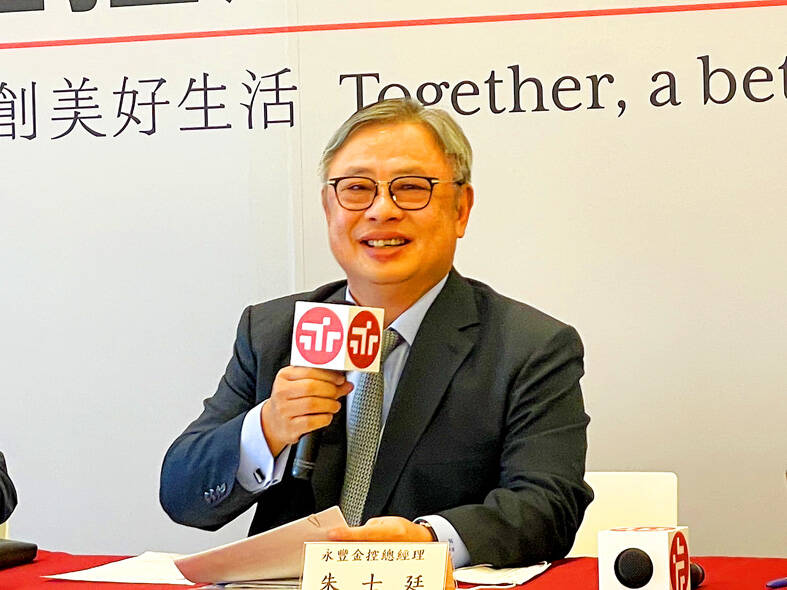SinoPac Financial Holdings Co (永豐金控) is confident in the local banking sector’s health as global financial sector fears are easing and most local bank deposits have been insured by Central Deposit Insurance Corp (CDIC), company president Stanley Chu (朱士廷) told an investors’ conference in Taipei yesterday.
One of the reasons the recent US bank failures have caused panic is because most of the deposits are not insured by the US Federal Deposit Insurance Corp (FDIC), Chu said.
The FDIC’s deposit guarantees are capped at US$250,000 per account, and about 86 percent of Silicon Valley Bank’s deposits were uninshured, he said.

Photo: Kelson Wang, Taipei Times
In Taiwan, the CDIC offers maximum insurance coverage of NT$3 million (US$98,733) per depositor, and 98 percent of local bank deposits are under that threshold, so most depositors are covered, Chu said.
Taiwan’s banks have good capital adequacy and relatively few non-performing loans, he said.
“There is a slim chance that local banks would experience the same crisis as the American banks did,” he added.
Last year, SinoPac Financial had the highest return on equity (ROE) among its local peers at 10.1 percent, the company said yesterday.
ROE, calculated by dividing net income by shareholders’ equity, indicates how efficiently a company is generating profit. The company ranked 10th among local financial holding firms in 2019 when its ROE stood at 8.6 percent.
Interest rate hikes in Taiwan and the US pushed the company’s net interest income up by 22 percent year-on-year to NT$26.9 billion last year, SinoPac Financial said.
The company’s net fee income plunged 18 percent last year, causing its total net profit to drop 1.5 percent from a year earlier to NT$15.96 billion, it said.
Its banking arm, Bank SinoPac (永豐銀行), generated net profit of NT$14.72 billion last year, accounting for 92 percent of the company’s total profit, and its securities unit, SinoPac Securities Co (永豐金證券), made up the rest, company data showed.
This year, Bank SinoPac plans to use a freshly raised NT$10 billion to boost its capital adequacy instead of using it for investment or expansion, due to economic uncertainties, it said.
“Most local financial holding companies with a focus on the insurance business had a difficult time last year, and are facing tighter accounting rules going forward,” Chu said. “As a result, we are cautious about the insurance business and will not consider merger and acquisition activities with an insurance company.”

CHIP WAR: Tariffs on Taiwanese chips would prompt companies to move their factories, but not necessarily to the US, unleashing a ‘global cross-sector tariff war’ US President Donald Trump would “shoot himself in the foot” if he follows through on his recent pledge to impose higher tariffs on Taiwanese and other foreign semiconductors entering the US, analysts said. Trump’s plans to raise tariffs on chips manufactured in Taiwan to as high as 100 percent would backfire, macroeconomist Henry Wu (吳嘉隆) said. He would “shoot himself in the foot,” Wu said on Saturday, as such economic measures would lead Taiwanese chip suppliers to pass on additional costs to their US clients and consumers, and ultimately cause another wave of inflation. Trump has claimed that Taiwan took up to

A start-up in Mexico is trying to help get a handle on one coastal city’s plastic waste problem by converting it into gasoline, diesel and other fuels. With less than 10 percent of the world’s plastics being recycled, Petgas’ idea is that rather than letting discarded plastic become waste, it can become productive again as fuel. Petgas developed a machine in the port city of Boca del Rio that uses pyrolysis, a thermodynamic process that heats plastics in the absence of oxygen, breaking it down to produce gasoline, diesel, kerosene, paraffin and coke. Petgas chief technology officer Carlos Parraguirre Diaz said that in

Japan intends to closely monitor the impact on its currency of US President Donald Trump’s new tariffs and is worried about the international fallout from the trade imposts, Japanese Minister of Finance Katsunobu Kato said. “We need to carefully see how the exchange rate and other factors will be affected and what form US monetary policy will take in the future,” Kato said yesterday in an interview with Fuji Television. Japan is very concerned about how the tariffs might impact the global economy, he added. Kato spoke as nations and firms brace for potential repercussions after Trump unleashed the first salvo of

SUPPORT: The government said it would help firms deal with supply disruptions, after Trump signed orders imposing tariffs of 25 percent on imports from Canada and Mexico The government pledged to help companies with operations in Mexico, such as iPhone assembler Hon Hai Precision Industry Co (鴻海精密), also known as Foxconn Technology Group (富士康科技集團), shift production lines and investment if needed to deal with higher US tariffs. The Ministry of Economic Affairs yesterday announced measures to help local firms cope with the US tariff increases on Canada, Mexico, China and other potential areas. The ministry said that it would establish an investment and trade service center in the US to help Taiwanese firms assess the investment environment in different US states, plan supply chain relocation strategies and